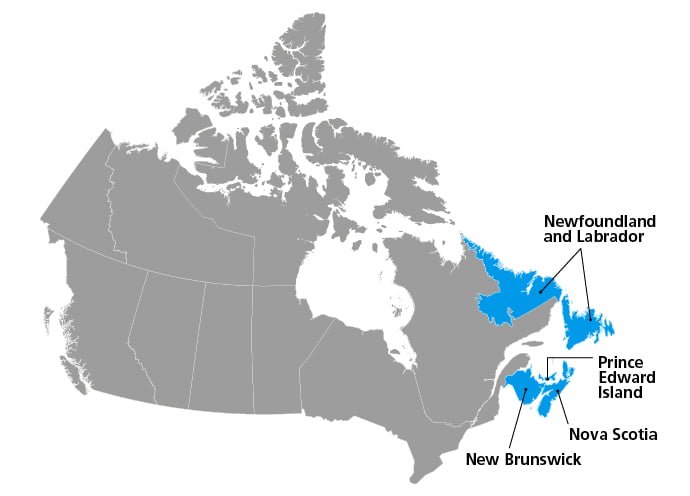How To Apply on the New Atlantic Immigration Program

How to participate in the program
The Atlantic Immigration Program is a pathway to permanent residence for skilled foreign workers and international graduates who want to work and live in 1 of Canada’s 4 Atlantic provinces.

This is an employer-driven program designed to help employers in Atlantic Canada hire qualified candidates for jobs they have been unable to fill locally. You must receive a job offer from a designated employer in Atlantic Canada to participate in the program.
To immigrate to Atlantic Canada through this program, you must be either
- a recent graduate of a recognized post-secondary institution in Atlantic Canada, or
- a skilled worker
You can be living abroad or already be in Canada as a temporary resident.
Who can apply
To be eligible for the Atlantic Immigration Program, you must
- have qualifying work experience, unless you’re an international graduate of a recognized post-secondary institution in Atlantic Canada
- meet or exceed the educational requirements
- meet or exceed the language requirements
- show that you have enough money to support yourself and your family when you get to Canada
- If you’re already living and working in Canada with a valid work permit, you don’t need to show proof.
If you meet all of these requirements, you can start looking for a job with a designated Atlantic employer.
Work experience
In the last 5 years, you must have worked at least 1,560 hours. This is the number of hours you would have worked in 1 year if you were working 30 hours per week.
To calculate your hours
- Count hours worked in part-time and full-time jobs.
- Count only paid hours of work. Volunteering or unpaid internships don’t count.
- Don’t count hours when you were self-employed.
- Count hours worked inside or outside Canada. You must have been legally authorized to work in Canada as a temporary resident.
- Count hours that were accumulated over a period of at least 12 months.
- Count work experience acquired while studying, as long as the work hours don’t exceed what was authorized.
This work should be at one of these National Occupational Classification (NOC) skill levels
- NOC Skill Type 0 (management jobs such as restaurant managers, mine managers)
- NOC Skill Level A (professional jobs that usually need a degree from a university, such as doctors, dentists, architects)
- NOC Skill Level B (technical jobs and skilled trades such as chefs, electricians, plumbers)
- NOC Skill Level C (intermediate jobs that usually call for high school and/or job-specific training, such as industrial butchers, long-haul truck drivers, food and beverage servers)
Your work experience must include
- the actions in the description of your NOC
- most of the main duties of your NOC
International graduates
You do not need to meet the work experience requirements if you’re an international graduate who
- has a degree, diploma, certificate, or trade or apprenticeship certification that
- took at least 2 years of studies
- is from a recognized post-secondary institution in 1 of the 4 Atlantic provinces (New Brunswick, Nova Scotia, Prince Edward Island, or Newfoundland and Labrador)
- was a full-time student for the entire time you were studying
- lived in one of the following provinces for at least 16 months during the last 2 years before you graduated
- New Brunswick
- Nova Scotia
- Newfoundland and Labrador or
- Prince Edward Island
- had the visa or permit you needed to work, study or get training while you were in Canada
Educational requirements
You must have one of these:
- If you have a job offer at the NOC 0 or A skill type or level, you must have a Canadian one-year post-secondary educational credential or higher, or the equivalent outside Canada.
- If you have a job offer at the NOC B or C skill level, you must have a Canadian high school diploma, or the equivalent outside Canada.
However, if you studied outside Canada, you need an educational credential assessment (ECA) to confirm that your studies are equal to or higher than the required level of education for your job offer.
- Your ECA report must be less than 5 years old on the date we receive your application.
Language requirements
You must meet the minimum language requirements based on the NOC category that applies to your job offer. This can either be the
- Canadian Language Benchmarks (CLB) or
- Niveaux de compétence linguistique canadiens (NCLC)
The minimum language requirements for each NOC category are
- CLB/NCLC 5 for NOC 0, A and B
- CLB/NCLC 4 for NOC C
You must submit your results from a designated language testing organization with your application. These results must be less than 2 years old when you apply.
Find out more about language testing.
Settlement funds
You need to have enough money to support yourself and your family when you get to Canada. The amount you need depends on the size of your family. The size of your family also includes anyone you support who isn’t immigrating with you.
Learn how much money you should have when you arrive in Canada.
If you’re already living and working in Canada with a valid work permit, you don’t need to show proof of funds.
How to get a job offer
You’ll need to seek job opportunities with designated employers. For more information, check the provincial websites:
The job offer must meet all of these requirements:
- The job offer must be full time, meaning you’ll work at least 30 paid hours per week.
- The job offer must be non-seasonal. In general, this means you have consistent and regularly scheduled paid employment throughout the year.
- For NOC 0, A or B skill type or level job offers, the employer must be offering you a job that will last at least 1 year (1 year from the time you become a permanent resident).
- For NOC C skill level job offers, the employer must be offering you permanent employment, that is, there is no set end date.
- The job offer cannot come from a company where you (the applicant) or your spouse is a majority owner.
- The job offer must be at the same skill level as, or higher than, the work experience that qualified you for the job (refer to the table below), unless you’re an international graduate from a recognized post-secondary institution in Atlantic Canada.
- For certain health care sector jobs, you don’t need to have a job offer at the same skill level as, or higher than, the qualifying work experience.
- Work experience in NOC 3233 (practical nurses) and NOC 3012 (registered nurses) can be used as qualifying work experience if you have a job offer in NOC 3413 (nurse aides, orderlies and patient service associates) or NOC 4412 (home health care workers).
- For certain health care sector jobs, you don’t need to have a job offer at the same skill level as, or higher than, the qualifying work experience.
When a designated employer offers you a job, they’ll give you an Offer of Employment to a Foreign National form [IMM 0157] (PDF, 317 KB) . You must
- make sure you meet the employment requirements listed in the National Occupational Classification
- sign the form titled Offer of Employment to a Foreign National and keep a copy for your records
- You’ll need this form when you work with a service provider organization on your settlement plan and for your permanent residence application.
If you receive a job offer from an employer
- ask for a copy of the employer’s Confirmation of Designation, or
- tell them about the Atlantic Immigration Program and ask them to consider becoming designated, if they aren’t already
Start gathering your documents for your permanent residence application early
You should start getting your documents ready early to avoid delays when you apply for your permanent residence in Atlantic Canada.
Language test
You must take a language test and send the results with your application. You must do this even if you studied in Canada.
Learn about language testing for the Atlantic Immigration Program
Educational credential assessment
If you studied outside Canada, you need an educational credential assessment (ECA) report. This report shows how your education compares to a Canadian one.
Proof of funds
When you arrive in Canada, you need enough money to support yourself and your family. Find out how much money you should have when you arrive in Canada.
If you’re already living and working in Canada with a valid work permit, you don’t need to show proof of funds.
Other documents
There are other documents you must include in your application. Use the checklist in the application guide to make sure you have all of the documents.
You can start preparing your application now but you can’t submit it until you have all of the required documents.
Get a settlement plan
After you get a job offer from a designated employer, you need to get a settlement plan.
A settlement plan will help you and your family adjust to your new home in Atlantic Canada. It will provide you with useful resources and contacts to help you feel welcome in your new community.
These plans are free.
If you’re already in Canada: You must work with a settlement service provider organization in the region where you’ll be working. Your designated employer can help you find one.
If you’re outside Canada: There are several settlement service provider organizations in Canada that you can contact. Check with your designated employer for recommendations.
If you prefer French as your official language: There are Francophone organizations that can help you.
Find a settlement service provider organization and get a settlement plan.
Settlement service provider organizations don’t know which employers are looking for workers. Don’t contact them to find a job.
Once you have your settlement plan, give a copy to your employer and keep a copy for yourself. If you’re not in Canada, bring the plan with you when you move to Canada.
Get your Certificate of Endorsement
After you have your settlement plan, the province must endorse your job offer. Your employer will handle this process. Don’t submit your permanent residence application until you confirm with the employer that your offer has been endorsed.
If the province endorses your job offer, you’ll get a Certificate of Endorsement in the mail. Include your endorsement certificate with your permanent residence application.
For additional information on the Atlantic Immigration Program visit Canada.ca





